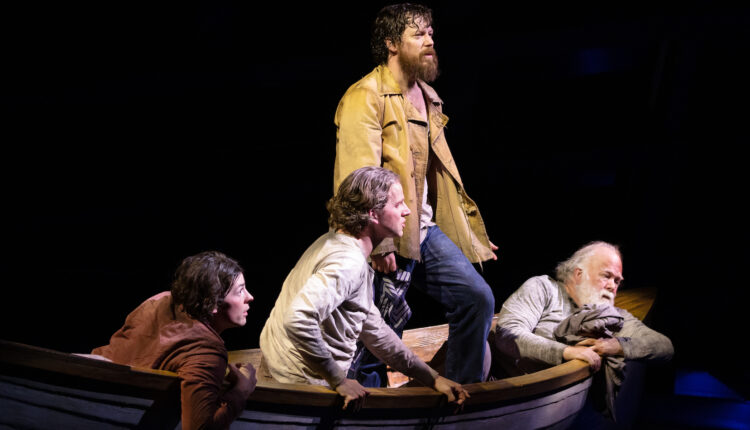By D.R. Lewis
This article was originally published in The DC Line, here.
The distance between The Avett Brothers’ upbringing in Concord, North Carolina, and the 19th-century whaling industry of New Bedford, Massachusetts, spans hundreds of miles and several lifetimes. But in Swept Away, a new musical that asks just how far humans will go to survive, sea shanties of a bygone era are replaced with selections from the folk rock band’s sweeping repertoire. Following its world premiere at Berkeley Repertory Theatre last year, Swept Away takes audiences out to sea in Arena Stage’s Kreeger Theater through Jan. 14.
Inspired by the true story of the shipwrecked Mignonette (and The Avett Brothers album of the same name), Swept Away opens on a white metal cot where a former whaler, Mate (John Gallagher Jr.), lies dying from tuberculosis. As his body deteriorates from illness and his mind wanders to the past, he is haunted by the ghosts of three seamen who suffered alongside him in younger days: a youthful sailor, Little Brother (Adrian Blake Enscoe), Big Brother (Stark Sands) and their Captain (Wayne Duvall). They implore him to recount the story of their shared struggles as the lone survivors of a shipwreck. As the tale unfolds, we watch the men endure disaster, followed by weeks of starvation and thirst while adrift on a small lifeboat. When their situation becomes more and more fraught, they are forced to confront impossible questions of salvation, mercy and depravity in order to survive.
Comprised of hand-picked songs from The Avett Brothers’ extensive catalog of rock, roots and Americana, the musical’s folk score ranges from cheeky commentary on life at sea (“Hard Worker”) to the regrets of a career captain (“May It Last”) to a young man’s yearning for his distant lover when the fragile nature of life finally sets in (“A Gift for Melody Anne”). The arrangements by orchestrators Brian Usifer and Chris Miller vary accordingly, taking on both electric and acoustic treatments. Gallagher, Duvall, Sands and Enscoe are careful stewards of the Avett Brothers’ beloved songs, and their four voices blend remarkably well in group numbers and soar in solo turns. When combined with the (frequently offstage) ensemble, the tight harmonies work to haunt and comfort in equal measure.
John Logan’s book provides a sturdy framework for the score while resisting the oft-indulged urge of other jukebox musicals to shoehorn existing songs into a complex, contrived plot. He chooses to go deep, rather than wide, providing enough details to bring the characters to life. He offers suitable dialogue to advance the simple story when needed and adequately tees up the songs for optimal impact. Despite by and large deferring to the score, Logan does put forth some meaty moral commentary that, while it occasionally feels trite, ultimately leaves audiences with plenty to ponder.
As the Mate, an extremely charismatic Gallagher quickly captures the audience’s attention, never relinquishing his grasp even as ne’er-do-well charm devolves amid ravenous desperation. Duvall’s forlorn Captain lies somewhere between the Titanic’s steadfast Capt. Edward Smith and a defeated Willy Loman, struggling to accept the personal price he has paid for a career at sea. His self-professed failure to nurture his family is made all the more poignant by the devoted relationship Big Brother and Little Brother share. Despite a limited backstory, the chemistry between Sands and Enscoe is so strong that when an inevitable confrontation finally arrives and a dramatically logical but disturbing choice is made, the audience is left breathless.
Where Enscoe’s Little Brother is all heart, Sands’ Big Brother is entirely soul. His tenderness is at odds with the pompous masculinity of the ship’s crew, eliciting initial laughs from the audience. But as circumstances become increasingly dire, his enduring affection for his sibling and commitment to his faith are balm for both Little Brother and the audience. In the duet “Murder in the City,” the brothers affirm the importance of their familial love and the preciousness of their connection, despite their discordant dreams. “Always remember there was nothing worth sharing like the love that let us share our name,” they softly sing, moments before their lives, along with the ship, are upended forever.
Swept Away offers a departure from the flashy production numbers that are a hallmark of recent jukebox musicals like Jagged Little Pill (Alanis Morissette), Head Over Heels (The Go-Go’s, also directed by Michael Mayer) and Once Upon a One More Time (Britney Spears, which premiered at DC’s Shakespeare Theatre Company in 2021). With some exceptions — a mashup of “Ain’t No Man” with “Lord Lay Your Hand on My Shoulder” (a new song written for the show), and “Hard Worker” (an upbeat song that puts the ensemble front and center) — most of the musical numbers feel like a continuing series of gentle reflections. While the songs do little in the way of moving the scant plot along, Logan’s careful curation of the tight 90-minute setlist does an admirable job of deepening the audience’s understanding of, and sympathy for, the characters. Given the circumstances, it’s a good fit.
So is the show’s director. Mayer may be best known for his work on Spring Awakening, the coming-of-age rock musical that earned both him and Gallagher their first Tony Awards. But nearly 20 years after Spring Awakening first opened in New York, Swept Away feels like a matured extension of that groundbreaking musical. The social loneliness of adolescence has given way to physical isolation on the open sea; the strict expectations of parents, educators and church leaders are left onshore, while the pressures of one’s humanity, faith and sense of self push against the instinct to survive; and the immobilizing fear of a long life ahead is replaced with the regrets of one already lived.
Beyond his handle on the show’s most compelling dramatic questions, Mayer’s handiwork as a technician comes through clearly. He succeeds in keeping the pace of the show at a steady clip, even as the sailors languish in expectant waiting. The starkness of the four stranded sailors in a tiny boat, slowly spinning in the absence of their lost crewmates, is a major shift from the lively deck that bustles with activity earlier in the show. In conjunction with his creative team, Mayer steadily ratchets up the desperation through the latter half of the show, beginning with the initial tempest that precipitates the ship’s sinking. The battering of the ship and its crew is one of the most impressive sequences in the production. At first mildly tossed by the sea, the crew soon is thrown about the stage in perfect coordination. Where David Neumann’s slick choreography of the musical’s early group numbers shows the crew united in their controlled movements about the ship, once at the mercy of the ocean they are unified only in their powerlessness.
The strong direction is matched by excellent technical work by Mayer’s creative team. Rachel Hauck’s massive ship set fills the Kreeger stage and, in a deeply satisfying coup, transforms in an instant to underscore both the isolation of the surviving sailors and the endlessness of the open sea. Kevin Adams’ lighting ebbs and flows between the harsh, reflective brightness of a blazing sun, and the shadowy bluish green darkness that intimates memories and the ocean floor. John Shivers’ sound design fills the background quietly, regularly resurfacing with reminders of waves lapping at the boat. And Susan Hilferty’s worn costumes subtly reflect the salty residue of a life lived at sea.
Despite the similarities between musical theater and country (or country-adjacent) music, which both rely heavily on narrative-driven storytelling over abstract hooks, prior attempts to merge the genres (Shucked,Bright Star, 9 to 5, Urban Cowboy, etc.) have met with varying levels of success. But unlike those past iterations, Swept Away boldly leverages its source material to present compelling existential dilemmas to its audience. The direness of the characters’ circumstances and their resulting moral abandonment forces viewers to confront deeply difficult questions. What would I sacrifice to save the ones I love most? How far would I go to see another sunrise? And, as so poignantly asked in the song “No Hard Feelings”: “When my body won’t hold me anymore and it finally lets me free, will I be ready?”
Not everyone will be willing to confront those difficult quandaries on a night out at the theater. Still, those theatergoers who take their seats ready to be challenged are likely to relish in this bold new musical. And, in its ultimate faithfulness to its source material, Swept Away will surely satisfy The Avett Brothers’ most devoted followers.
In this maiden musical theater voyage, Swept Away makes a strong case that the band’s musical style lends itself naturally to dramatization and holds great potential to make a splash.. The show’s producers have been clear that their sights are on the Great White Way, and Arena Stage has already added two weeks to the show’s run — an extension announced just before Wednesday’s official opening after a week and a half of previews. While it remains unclear whether this ship can successfully pull into New York Harbor and drydock somewhere along Broadway, Swept Away appears to be calling for another sailing.





No Comments